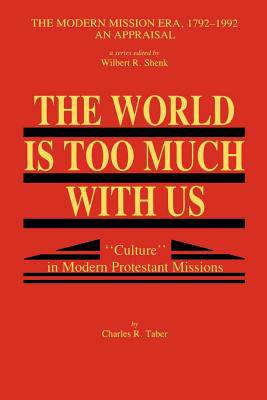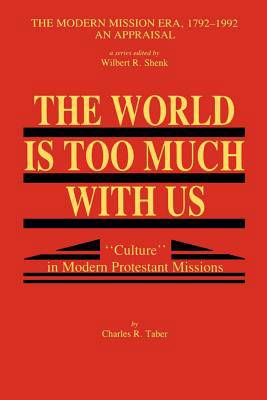
- Afhalen na 1 uur in een winkel met voorraad
- Gratis thuislevering in België vanaf € 30
- Ruim aanbod met 7 miljoen producten
- Afhalen na 1 uur in een winkel met voorraad
- Gratis thuislevering in België vanaf € 30
- Ruim aanbod met 7 miljoen producten
Zoeken
The World Is Too Much With Us
Culture in Modern Protestant Missions
Charles R Taber
Paperback | Engels
€ 32,95
+ 65 punten
Omschrijving
Taber explores the interaction in recent history between the modern missionary movement (especially its Protestant expressions) and concurrent developments in the social sciences, specifically the emergence of the concept of culture. To begin, he traces the prehistory of the concept of culture from antiquity through the Enlightenment, and up to the dawn of the modern Protestant missionary movement. He then describes the historical context of the nineteenth century in terms of processes such as the industrial revolution, the abolitionist movement, the colonial enterprise, and in terms of key ideas such as evolution and the birth of anthropology. Taber goes on to situate the place and rise of the modern missionary movement in the nineteenth century, tracing how it was influenced by prevalent ideas and attitudes and how it contributed to our understanding of culture and cultures. He then looks at twentieth-century theories of culture and discusses those that have influenced missiology. Finally, he examines and evaluates some unresolved issues in missions.
Specificaties
Betrokkenen
- Auteur(s):
- Uitgeverij:
Inhoud
- Aantal bladzijden:
- 236
- Taal:
- Engels
Eigenschappen
- Productcode (EAN):
- 9780865549296
- Verschijningsdatum:
- 5/09/2000
- Uitvoering:
- Paperback
- Formaat:
- Trade paperback (VS)
- Afmetingen:
- 152 mm x 229 mm
- Gewicht:
- 349 g

Alleen bij Standaard Boekhandel
+ 65 punten op je klantenkaart van Standaard Boekhandel
Beoordelingen
We publiceren alleen reviews die voldoen aan de voorwaarden voor reviews. Bekijk onze voorwaarden voor reviews.











